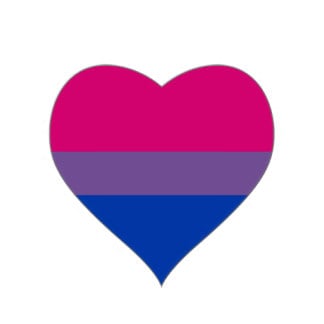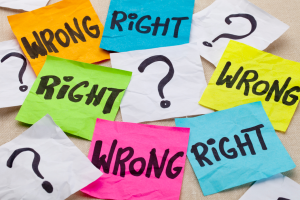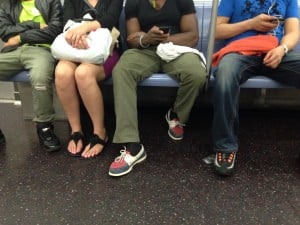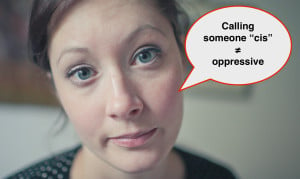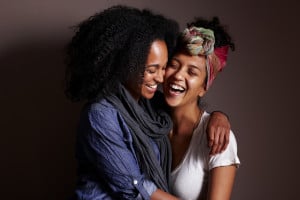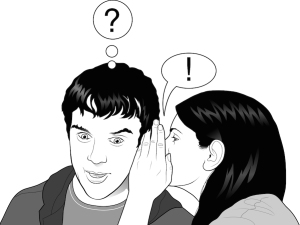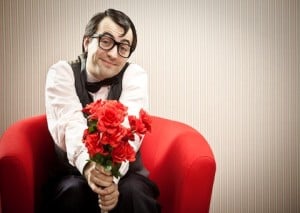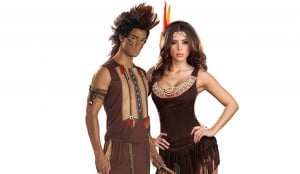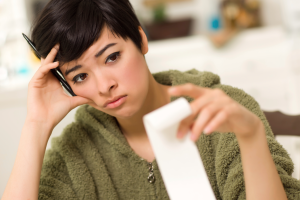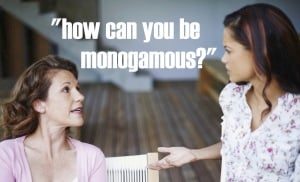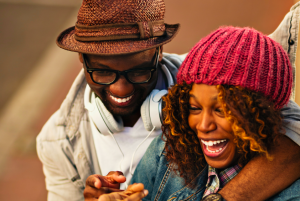Often, we’re taught to understand queerness as an all or nothing phenomenon. To be legitimately queer, you apparently have to know from the time you were a toddler and have the experience to prove it.
Common messaging tells us that if you’re anything other than 110% gay, you’re just confused — you’re either gay or you’re not.
For these reasons and others, identifying as bisexual can feel very isolating.
Bisexual people are constantly forced to move through a culture that’s saturated by skepticism from both the gay and straight communities. Particularly if you’re young or just discovering who you are, the realities of bisexuality might seem like too much of a burden.
But fear not, fellow frustrated bisexuals! There are ways to stand up to mainstream biases and overcome toxic media messages in order to start embracing your identity.
1. Remember: You Shouldn’t Have to Compromise or Hide Your Bisexuality to Be Accepted by Other People
Even after identifying as bisexual for four years, I still feel hyper-conscious of the implications of my sexuality in different spaces.
Among my straight friends, I’m very careful not to talk about anything queer for fear of making things awkward. Conversely, in queer company, I’d much rather pass as a lesbian because biphobia can be much more intense in the gay community (and problematically, it’s perceived as almost a rite of passage because just about everyone seems to have a story about being screwed over by those sneaky bisexuals).
In either scenario, I’m viewing my bisexuality as a social detriment. I’d much rather accept whatever labels others choose to give me than deal with the potential fallout of labeling myself.
There are several factors that influence this stigma. As I mentioned, bisexuals are the target of universal hostility across orientations. If there’s one thing that straight and gay people can agree on, it’s that bisexual people are allegedly all noncommittal nymphomaniacs.
But at the end of the day, it’s not your job to convince people to like you, especially if it involves presenting a version of yourself that makes you feel uneasy or incomplete.
True friends are going to support you. The only reason your sexuality should matter to someone else is if they’re hoping to sleep with you. It’s bizarre that everyone is still so hung up on everyone else’s orientation when it really only impacts the individual and their partners.
Don’t waste your time on those who are only interested in judging you. They’re often condescending and never satisfied. You deserve to put your energy towards building a positive network.
The right people will embrace and respect every part of you.
2. Forget About ‘Picking a Side’
It’s the unwanted advice every bisexual person hears – the idea that if we could just decide whether or not we’re really straight or gay deep down, then we could truly be happy or worthy of being taken seriously.
After all, bi women only hook up with other women to get male attention and bi men are just hiding the fact that they’re gay, right?
Bisexual representation in media is embarrassingly one-dimensional. When it’s not used to justify girl-on-girl action for the male gaze, we only ever see it in the context of the bi character desperately trying to reassure their partner that they won’t cheat on them.
Also, as much as I fully endorse fluid sexuality and everyone’s right to be label-free, I might scream if I hear one more character insist they’re “not into labels.”
My anger is really directed at squeamish media executives who cringe at the thought of even mentioning the B-word. Representing sexual fluidity is great, but it also does nothing to remedy the complete absence of bisexual people in TV and film, which in turn reaffirms our perceived social illegitimacy.
Would it kill you to include a character who identifies as bisexual or pansexual? These aren’t dirty words. You’re not playing a game of Password.
And yes, I still have days where I try to convince myself that I’m a lesbian. I love being queer so much and I’m worried that continuously reaffirming my attraction to male-identified folks somehow reduces my proximity to queerness.
But I already know I’m not gay. I sure as hell know I’m not straight, too.
And therein lies the problem: It‘s ridiculous to try and shoehorn yourself into other orientations when you already have an orientation!
There aren’t any sides. Sexuality is a spectrum, not a sporting event.
3. Recognize That There Is No One Right Way to Be Bisexual
Given the common misconception of bisexuals as greedy and opportunistic, most discussions of biphobia make an attempt to immediately debunk the promiscuity myth. In a similar vein, not all bisexual people have to be in relationships with men and women at the same time to be happy.
Of course, bisexual people can be monogamous with one partner. They don’t want to sleep with everyone all the time. They’re not constantly scheming to leave you for someone of a different gender. This should be common sense, but we’re forced to reiterate these disclaimers again and again.
However, when you start basing the legitimacy of your identity around perpetually reassuring the majority of what you’re not, you inevitably throw a certain segment of the community under the bus.
Having lots of sex isn’t a bad thing! Having multiple partners isn’t a bad thing!
If you try to distance yourself from the promiscuous or polyamorous part of the bisexual community by implying that they represent “the wrong kind” of bisexuality, you’re not only creating internalized biphobia within yourself, but you’re also validating the prejudices of the majority by agreeing that not all forms of bisexuality should be respected.
Support promiscuous bisexuals. Support bisexuals who are in polyamorous relationships or relationships with partners of multiple genders.
Just because a group confirms a stereotype doesn’t automatically mean that they contribute to negative representation or deserve to be ostracized from the community.
Bisexual people face enough stigma without turning on each other.
4. Remind Yourself That You Do Have a Place in the LGBTQIA+ Community
Sometimes, being bisexual doesn’t feel like a cohesive identity at all. You have one foot in the straight community and one foot in the gay community, and you don’t really feel comfortable in either.
I was especially dismayed by the amount of biphobia I encountered in queer circles. Still, I reasoned, perhaps those individuals were entitled to biphobia.
And since I could just date men whenever I wanted, didn’t that amount to some sort of straight privilege? Hypothetically, I had the wider dating pool. My queerness could be nullified, or so I thought, at the drop of a hat.
Several lesbians I knew blamed bisexual women for their emotional baggage. I would always cringe internally because I felt personally responsible for the actions of someone else in my community, again feeding into the “bad bisexual” idea. No wonder they didn’t trust us!
It took me far too long to recognize the hypocrisy in their behavior.
Biphobia is almost more shameful in the queer community than in the straight community because queer people have faced so much similar prejudice.
Straight privilege inherently cannot exist for bisexual people because they’re not straight. Dating someone of a different gender doesn’t negate bisexuality, nor does dating someone of the same gender. That would be like saying if you commute to work, every time you come home you’re unemployed since you’re not physically in your office.
Further, if you’ve been hurt by someone who’s bisexual, that negative experience is completely unrelated to orientation.
They didn’t hurt you because they’re bisexual; they hurt you because they’re a toxic person. Or maybe the relationship failed for other reasons and you’re using their bisexuality as a scapegoat.
We’re part of the LGBTQIA+ acronym. Own that. Don’t allow negative generalizations and internalized biases to dictate how you express yourself.
The queer community is incredible and you deserve to enjoy that experience without feeling excluded or punished. Your identity is just as valid as everyone else’s.
5. Know That A Lot of Really Cool People Are Bisexual — Including You!
The media predictably has a tendency to pigeonhole bi celebrities as gay or straight.
As soon as the bi celebrity in question gets a partner or gives a quote that can be interpreted as leaning more towards one gender, the media “decides” their orientation and falsely represents them as straight or gay in all subsequent coverage.
Of course, this causes their bisexual fans to be unaware that their favorite celebrity is bisexual, meaning that their sense of alienation continues while representation is right under their noses!
Regardless, it doesn’t change the fact that our community is out there and very visible, even though things don’t always feel that way.
Even as the media continues to do a disservice to bisexuals, plenty of bisexual people are in the public eye.
Ezra Miller, Megan Fox, Michelle Rodriguez, and Alan Cumming are just a few examples, not to mention many other celebrities and historical figures.
Beyond that, being bisexual is just plain rad. We have to stop belittling ourselves or apologizing for not fitting into someone else’s definition of who they think should be.
***
We’re bisexual. Period. No hesitations, no explanations.
Bisexuality shouldn’t be a burden. It can be fun and liberating and full of opportunities for new experiences and relationships.
Celebrate your identity. Get out there and enjoy yourself!
[do_widget id=”text-101″]
Erin Tatum is a Contributing Writer at Everyday Feminism. She’s a feminist, queer theory lover, and television enthusiast living in Pennsylvania. She is particularly interested in examining the representation of marginalized identities in media. In addition to Everyday Feminism, she’s also a weekly contributor to B*tch Flicks. Follow her on Twitter @ErinTatum91 and read her articles here.
Search our 3000+ articles!
Read our articles about:
Our online racial justice training
Used by hundreds of universities, non-profits, and businesses.
Click to learn more


